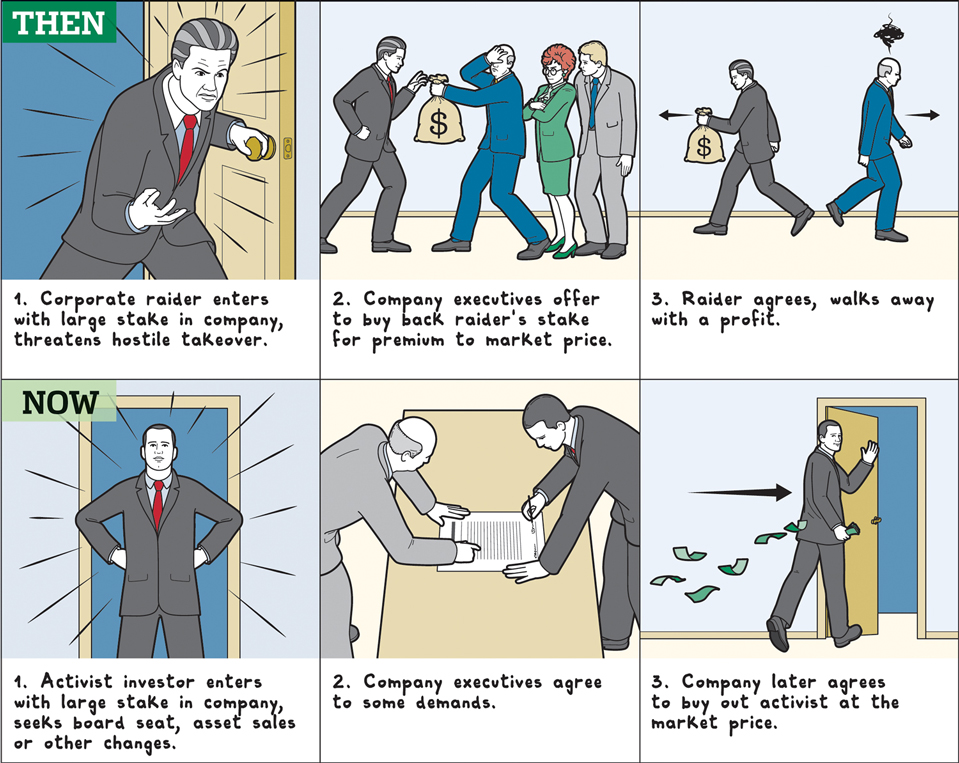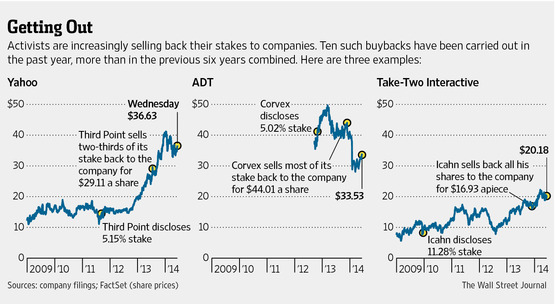|
THE WALL STREET
JOURNAL. |
MARKETS
|
Markets
Activist Funds
Dust Off 'Greenmail' Playbook
|
|
By
Liz Hoffman and David Benoit
June 11, 2014 7:03
p.m. ET
More
companies are resorting to an old tactic to get rid of activist
investors: Pay them to go away.
The
practice, which involves buying back shares from activist hedge funds,
has raised concerns among some investors because it bears similarities
to "greenmail," a controversial strategy popular in the 1980s.
Back
then, aggressive investors such as
Carl Icahn and the late Saul Steinberg bought company shares and
threatened a hostile takeover. Eager to avoid a battle, companies
including
Walt Disney Co. and
Goodyear Tire & Rubber Co.
bought back their stakes above market price, giving the activists a
quick profit.
The
practice, widely criticized as corporate blackmail, largely died out
by the early 1990s as companies beefed up defenses and lawmakers took
steps to discourage it.
But
in the past 12 months, at least 10 companies have repurchased blocks
of shares from activist investors, including
Daniel Loeb and
William Ackman, according to FactSet SharkWatch. That is more than
in the previous six years combined.
The
practice differs from greenmail in two crucial aspects. The share
buybacks aren't at a premium to the market but typically at or
slightly below the last trading price. They also don't follow threats
of hostile takeovers.
Advisers say these deals are likely to continue as activist hedge
funds, which have targeted more companies in recent years, look to
sell out of holdings.
Since the current wave of activism started in 2010, these investors
have launched 1,115 campaigns, according to FactSet, and many are ripe
for exits.
The
buybacks have fueled a common criticism of activist investors: They
chase short-term profits at the expense of other shareholders.
"You
can call it greenish mail," said Spencer Klein, a lawyer with Morrison
& Foerster LLP who advises companies facing activist investors. "These
investors are getting an opportunity that others aren't, and that's
not a terribly popular notion."
The
trend is setting off alarms even among activists, who have sought to
separate themselves from the "corporate raiders" of the 1980s and
portray themselves as good for all investors.
"I'm
the curmudgeon in the room. I see evidence of greenmail," Jeffrey
Ubben, founder of activist fund ValueAct Capital Management LP, said
at a conference recently. "We better be careful we don't kill the
golden goose."
Defenders of these new deals say they offer a clean, amicable divorce.
Large stakes can drag down a company's stock price if sold on the open
market, and even the expectation of an exit in the near future can
weigh on shares. Both sides make out better when the split happens
quickly, said some activist investors and corporate advisers.
Buybacks also boost remaining investors' cut of future profits by
reducing the total number of shares in the market, they said.
Damien Park, a consultant who advises both corporations and activists,
said if the price makes sense for a company to do a large buyback, it
can be a win for everybody.
"One
of the most difficult aspects of being an activist is your exit
strategy," Mr. Park said. "Once the stock moves in the right direction
and things are going smoothly, you have a conundrum."
Still, the deals have drawn criticism. Home-security firm
ADT Corp. in November bought
back most of a 5.3% stake held by Corvex Management LP, a hedge fund
run by Keith Meister. ADT paid the previous session's closing price,
and Mr. Meister left the board.
ADT's stock has underperformed this year and, on an investor
conference call in April, anger from one large shareholder spilled
into the open.
"You
guys have bought back…stock at very inappropriate prices, as far as I
can see," said Leon Cooperman of Omega Advisors Inc. Mr. Cooperman
said in an interview that companies should be held accountable for
buybacks just as if they were spending on plants or acquisitions.
"Management owes the shareholders an explanation," he said.
Chief Executive Naren Gursahaney responded on the call that ADT had
worked with advisers and believed the price was a discount. "We feel
that the valuation is significantly higher than where it is," Mr.
Gursahaney told Mr. Cooperman. ADT declined to comment beyond the
CEO's earlier remarks.
ADT
shares closed Wednesday at $33.53, down 24% from the price Mr. Meister
received.
In
the past year, similar deals have been struck at or near market
prices, between Mr. Ackman and
General Growth Properties
Inc.; Mr. Loeb and
Yahoo Inc.; and Mr. Icahn and
two companies,
WebMD Health Corp. and
Take-Two Interactive Software
Inc.
Many
of the deals came amid broader share-repurchase programs. In each of
those examples, except ADT, the stock currently trades above the
buyback price.
Messrs. Meister, Loeb and Ackman declined to comment. Mr. Icahn didn't
respond to a request for comment. Yahoo, General Growth, WebMD and
Take-Two declined to comment.
In
its heyday, greenmail deals added up to big sums. In 1984 alone,
public companies paid $3.5 billion in greenmail, with payments above
market price accounting for $600 million, according to a study by the
Securities and Exchange Commission.
Then
the "poison pill" was invented. These corporate defense mechanisms,
officially called shareholder-rights plans, defanged activist
investors by thwarting the hostile takeovers they used as leverage to
extract the buyback offers.
Regulators also stepped in. The Internal Revenue Service in 1987
introduced a tax of 50% on any profits from greenmail, while several
states passed laws that made it hard for companies to buy back stakes
from short-term investors at a premium.
Write to Liz Hoffman
at
liz.hoffman@wsj.com and David Benoit at
david.benoit@wsj.com
|

